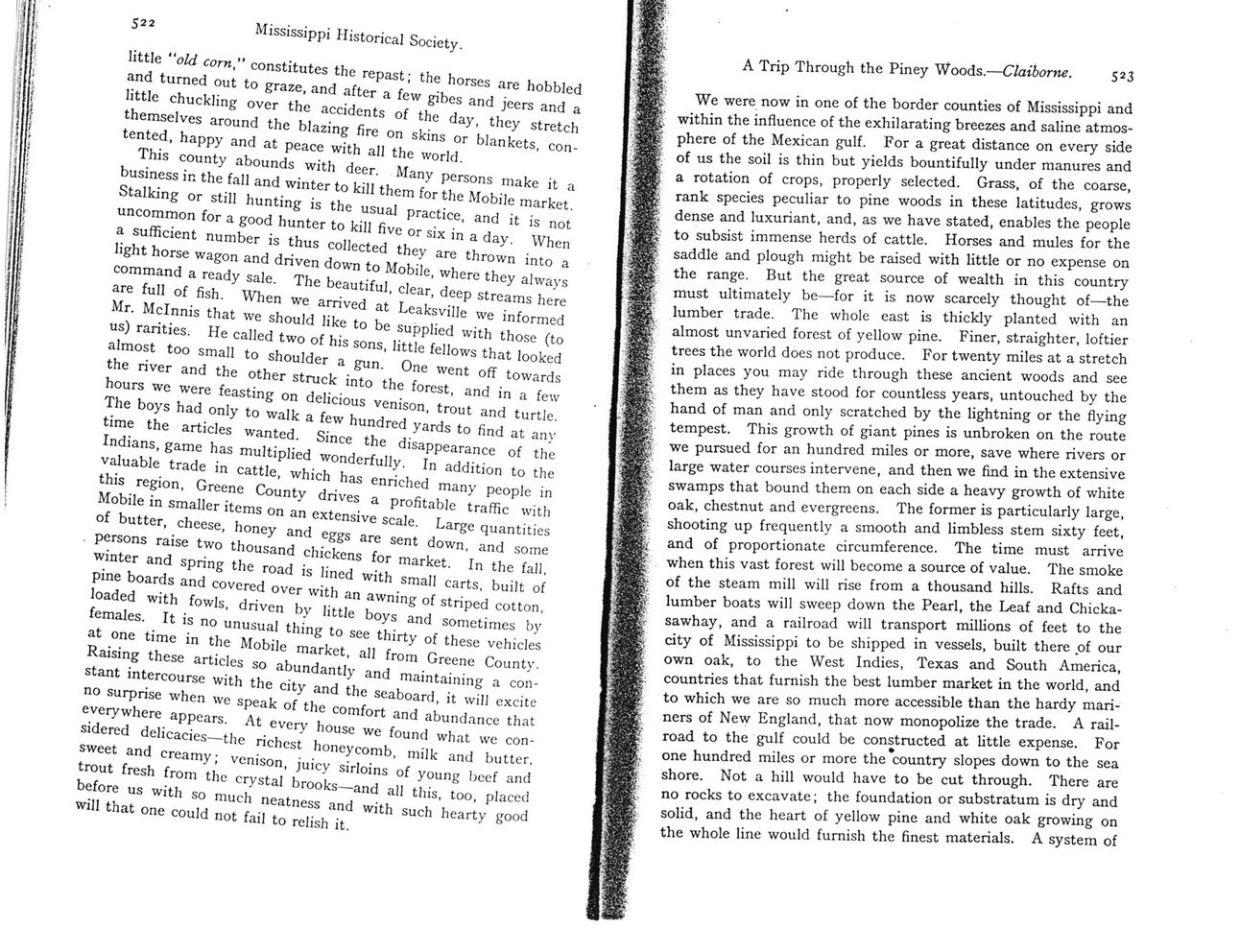This text was obtained via automated optical character recognition.
It has not been edited and may therefore contain several errors.
522 Mississippi Historical Society. little ?old corn," constitutes the repast; the horses are hobbled and turned out to graze, and after a few gibes and jeers and a little chuckling over the accidents of the day, they stretch themselves around the blazing fire on skins or blankets, contented, happy and at peace with all the world. This county abounds with deer. Many persons make it a business in the fall and winter to kill them for the Mobile market. Stalking or still hunting is the usual practice, and it is not uncommon for a good hunter to kill five or six in a day. When a sufficient number is thus collected they are thrown into a light horse wagon and driven down to Mobile, where they always command a ready sale. The beautiful, clear, deep streams here are full of fish. When we arrived at Leaksville we informed Mr. Mclnnis that we should like to be supplied with those (to us) rarities. He called two of his sons, little fellows that looked almost too small to shoulder a gun. One went off towards the river and the other struck into the forest, and in a few hours we were feasting on delicious venison, trout and turtle. The boys had only to walk a few hundred yards to find at any time the articles wanted. Since the disappearance of the Indians, game has multiplied wonderfully. In addition to the valuable trade in cattle, which has enriched many people in this region, Greene County drives a profitable traffic with Mobile in smaller items on an extensive scale. Large quantities of butter, cheese, honey and eggs are sent down, and some . persons raise two thousand chickens for market. In the fall, winter and spring the road is lined with small carts, built of pine boards and covered over with an awning of striped cotton, loaded with fowls, driven by little boys and sometimes by females. It is no unusual thing to see thirty of these vehicles at one time in the Mobile market, all from Greene County. Raising these articles so abundantly and maintaining a constant intercourse with the city and the seaboard, it will excite no surprise when we speak of the comfort and abundance that everywhere appears. At every house we found what we considered delicacies?the richest honeycomb, milk and butter, sweet and creamy; venison, juicy sirloins of young beef and trout fresh from the crystal brooks?and all this, too, placed before us with so much neatness and with such hearty good will that one could not fail to relish it. A Trip Through the Piney Woods.?Claiborne. 523 We were now in one of the border counties of Mississippi and within the influence of the exhilarating breezes and saline atmosphere of the Mexican gulf. For a great distance on every side of us the soil is thin but yields bountifully under manures and a rotation of crops, properly selected. Grass, of the coarse, rank species peculiar to pine woods in these latitudes, grows dense and luxuriant, and, as we have stated, enables the people to subsist immense herds of cattle. Horses and mules for the saddle and plough might be raised with little or no expense on the range. But the great source of wealth in this country must ultimately be?for it is now scarcely thought of?the lumber trade. The whole east is thickly planted with an almost unvaried forest of yellow pine. Finer, straighter, loftier trees the world does not produce. For twenty miles at a stretch in places you may ride through these ancient woods and see them as they have stood for countless years, untouched by the hand of man and only scratched by the lightning or the flying tempest. This growth of giant pines is unbroken on the route we pursued for an hundred miles or more, save where rivers or large water courses intervene, and then we find in the extensive swamps that bound them on each side a heavy growth of white oak, chestnut and evergreens. The former is particularly large, shooting up frequently a smooth and limbless stem sixty feet, and of proportionate circumference. The time must arrive when this vast forest will become a source of value. The smoke of the steam mill will rise from a thousand hills. Rafts and lumber boats will sweep down the Pearl, the Leaf and Chicka-sawhay, and a railroad will transport millions of feet to the city of Mississippi to be shipped in vessels, built there of our own oak, to the West Indies, Texas and South America, countries that furnish the best lumber market in the world, and to which we are so much more accessible than the hardy mariners of New England, that now monopolize the trade. A railroad to the gulf could be constructed at little expense. For one hundred miles or more the country slopes down to the sea shore. Not a hill would have to be cut through. There are no rocks to excavate; the foundation or substratum is dry and solid, and the heart of yellow pine and white oak growing on the whole line would furnish the finest materials. A system of

Claiborne, J.F.H Claiborne-J.F.H-029